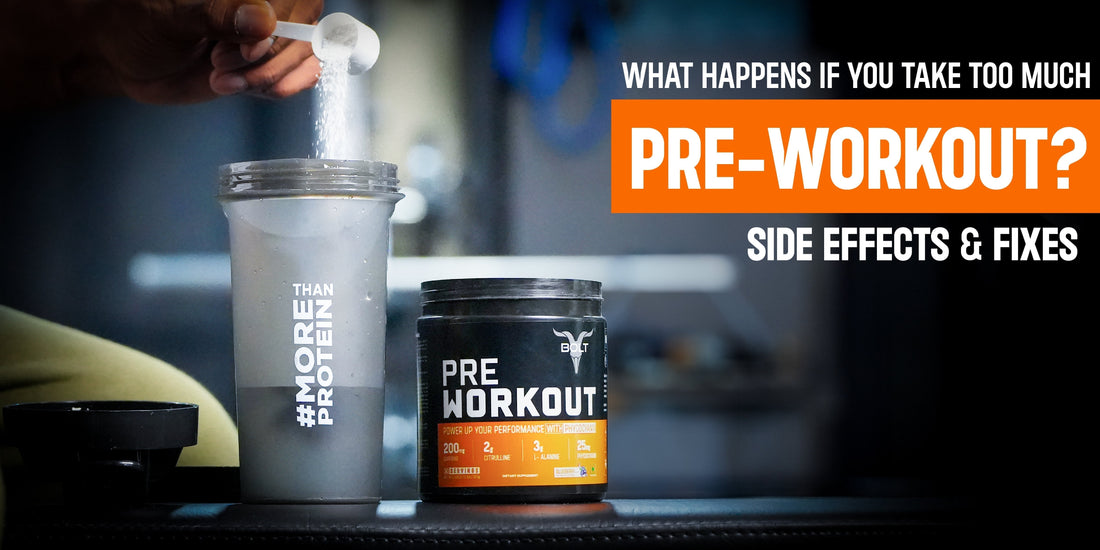
What Happens If You Take Too Much Pre-Workout? Side Effects & Fixes
byPre-workout supplements are crafted to enhnace energy, focus, and endurance during workouts. However, taking too much pre-workout can lead to unwanted side effects that may harm performance and overall health.
In this guide, we’ll explore what happens when you overdose on pre-workout, the side effects to watch for, and how to fix it if you’ve taken too much.
Signs You’ve Taken Too Much Pre-Workout
1. Increased Heart Rate & High Blood Pressure
Why it happens: Many pre-workouts contain high doses of caffeine and stimulants, which can cause rapid heartbeat (tachycardia) and elevated blood pressure.
2. Jitters & Anxiety
Why it happens: Excess caffeine overstimulates the central nervous system, leading to shakiness, restlessness, and anxiety.
3. Digestive Issues (Nausea, Diarrhea, Bloating)
Why it happens: Ingredients like creatine, sodium bicarbonate, and artificial sweeteners can cause stomach discomfort, nausea, or diarrhea.
4. Insomnia & Sleep Disturbances
Why it happens: If taken too late in the day, stimulants like caffeine, yohimbine, and synephrine can make it difficult to fall asleep or stay asleep.
5. Tingling Sensation (Paresthesia)
Why it happens: Beta-Alanine, a common ingredient in pre-workout supplements, can cause a temporary tingling or itching sensation—which is harmless but uncomfortable.
6. Headaches & Dehydration
Why it happens: Some pre-workouts contain vasodilators like citrulline and arginine, which increase blood flow but may cause headaches if not enough water is consumed.
7. Energy Crash
Why it happens: A sudden drop in energy levels post-workout can occur due to excessive stimulant use, leading to fatigue and sluggishness.
How to Fix Pre-Workout Overdose
1. Stay Hydrated
Drinking plenty of water helps flush out excess stimulants and reduces headaches, nausea, and dehydration-related symptoms.
2. Eat a Small Meal
Consuming protein, healthy fats, and complex carbs can help slow caffeine absorption and reduce its effects.
3. Engage in Light Physical Activity
A short walk or light stretching can help metabolize excess stimulants faster and relieve jitters.
4. Avoid More Stimulants
Skip coffee, energy drinks, and additional caffeine to prevent worsening symptoms.
5. Take Deep Breaths & Relax
Try deep breathing, meditation, or a warm shower to calm the nervous system and reduce anxiety.
6. Monitor Your Symptoms
If you experience severe heart palpitations, dizziness, or chest pain, seek medical attention immediately.
How to Avoid Pre-Workout Overdose
- Stick to the Recommended Dose – Never exceed the serving size listed on the label.
- Start with Half a Scoop – If you’re new to pre-workout, start with a smaller dose to assess tolerance.
- Avoid Taking Pre-Workout Too Late – Take it at least 5-6 hours before bedtime to prevent insomnia.
- Check the Caffeine Content – Some pre-workouts contain 300mg+ of caffeine per serving—equal to 3-4 cups of coffee.
- Cycle Off Pre-Workout – Take off from pre-workouts can help reset your tolerance.
FAQ
1. How long do pre-workout side effects last?
Most effects, like jitters or increased heart rate, last 2-6 hours, depending on your metabolism and caffeine sensitivity.
2. Can too much pre-workout be dangerous?
Yes. Excess caffeine and stimulants can cause heart palpitations, high blood pressure, and even hospitalization in severe situations.
3. Can you build a tolerance to pre-workout?
Yes. Frequent usage of high-stimulant pre-workouts can result in diminished benefits over time, necessitating greater doses for the same energy boost.
4. Should I take pre-workout every day?
No. Using pre-workout daily can lead to caffeine dependency and adrenal fatigue. Use it only on intense training days.
5. What’s the safest way to take pre-workout?
- Follow the recommended dosage.
- If you're sensitive to stimulants, begin with half a scoop.
- Pre workout should consume 30-40 minute before start workout.
- Drink plenty of water to stay hydrated.
Conclusion
While pre-workout supplements can boost performance, taking too much can lead to jitters, insomnia, nausea, and other side effects. Always take the proper dosage, remain hydrated, and listen to your body.








